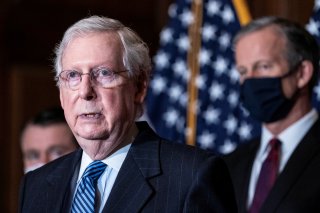Rep. Michael Burgess Voices Support for $2,000 Stimulus Checks
Economists suggest that stimulus checks “may actually be less effective” than other provisions that may be more laser-focused on certain sectors of the economy and labor market.
Rep. Michael Burgess (R-Texas) said Monday that he backs President Donald Trump and House Speaker Nancy Pelosi’s (D-Calif.) push for larger stimulus checks in the next round of coronavirus relief.
Burgess’s comments come as House lawmakers head to Capitol Hill to vote on boosting the bill’s direct payments to $2,000, a figure Trump proposed last week after blasting the $900 billion stimulus package that offered $600 checks to Americans. Both sides of the aisle have voiced support for the increase.
When asked on Fox News’s “Fox & Friends” if he’d vote on the measure, Burgess responded, “First off, it would be great to be able to see the legislative language that Nancy Pelosi is proposing,” noting that he doesn’t think “anyone has seen it beyond the broad contours of there needs to be more money to Americans,” a notion that he agrees with.
“I agree with that. I agree with the president on that. I think he’s exactly correct,” Burgess said. “I voted against the bill last week because I thought it was too big and too many moving parts, too difficult for people to comprehend.”
He added, “The final analysis: It really wasn't the help to the American people that the president had envisioned so he wisely instructed us about that and we’ll see today what comes out of the speaker's office.”
Trump committed to a reversal and signed the massive spending bill Sunday night, but he and other lawmakers in Washington, DC are still plunging for higher checks for Americans.
While almost all Democrats have sided with the president’s initiatives, some GOP congressional leaders said they’ll only support the increase in direct payments as long as there’s a reduction in the legislation’s pork spending.
“I think you do have to demonstrate at least some willingness to disclose offsets,” Burgess said when asked if he would support a standalone stimulus check increase or if the initiative should simultaneously come with decreases in other forms of spending. “At the very least, shouldn't we know the price tag?”
Economists, however, suggest that stimulus checks “may actually be less effective” than other provisions that may be more laser-focused on certain sectors of the economy and labor market.
“It’s a bridge to get to a point at which the economy can recover, virus-free,” Kyle Pomerleau, economist and resident fellow at the American Enterprise Institute (AEI), said, referring to the relief package. “As such, checks may actually be less effective than something more targeted such as expanded [unemployment insurance] or [paycheck protection program], which get money to firms and individuals that have lost the most. Checks, which are more universal, are going to some households that don't need assistance at all.”
Pomerleau noted, “I don't think additional rebates will necessarily hurt. The cost will be additional debt, but the cost of additional debt right now is small.”
Alan Viard, economist and resident scholar at AEI, echoed Pomerleau’s remarks saying, “Larger stimulus checks would add to the government debt, imposing additional burdens on future taxpayers.”
“Congress must strike a delicate balance between the short-run benefits and the long-run costs. The proper size of the rebates is far from clear,” Viard added.
In previous negotiations, several GOP lawmakers opposed any direct payments, but after firm talks with members from both sides of the aisle, Congress agreed on $600 stimulus checks in the latest round of federal aid. But after Trump’s recent refusal to sign the coronavirus relief package, House Democrats prepared a bill to supply $2,000 checks, a measure that’s expected to hit the floor on Monday.
“Before widespread availability of the vaccine, the economy will remain weak. Many people will be unwilling to spend money in the same way as before and this will mean lower revenues for many service sector businesses and lost jobs and income for service sector workers. That is why I prefer to think of these packages of economic ‘relief’ rather than stimulus,” Pomerleau said. “People may get additional money and spend a little more on the margin, but many people will save.”
Rachel Bucchino is a reporter at the National Interest. Her work has appeared in The Washington Post, U.S. News & World Report and The Hill.
Image: Reuters

